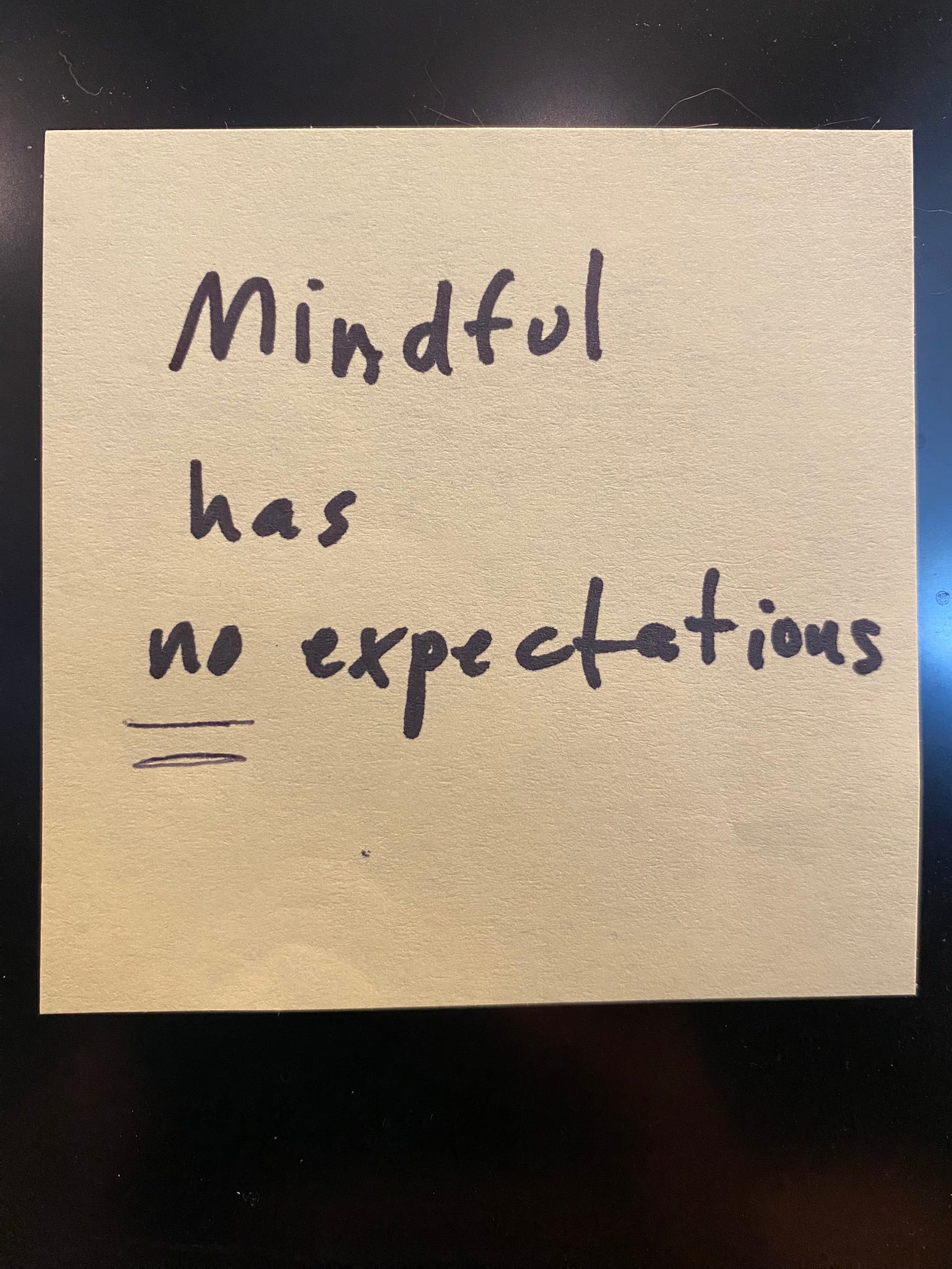U/B 33: It's not mindful to think about mindfulness but sometimes we must
A cross-post from Daily Sticky
Hi, I wrote something on my other blog, Daily Sticky (past and current notes-to-self), that I think is worth sharing with my Useful / Beautiful subscribers. If you’re already a Daily Sticky subscriber, you can skip this one.
I’m copy/pasting the full text below. Or you can click on this link to read the original (and subscribe for free to Daily Sticky).
Hi! Today is one of those posts where I basically BS my way through because I kinda sorta know what I’m talking about from a rational, logical perspective, but I don’t know it deeply. Which is why I wrote this note-to-self in the first place. To return to it.
Remember how You cannot burnout if you are mindful from yesterday’s Daily Sticky? If we want to prevent or stop burnout (and mindfulness is a viable answer) then we need to understand what it means be mindful.
Today’s sticky is:
Mindful has no expectations
What is mindful?
Thinking about what it means to be mindful is not a mindful activity. That’s fine. I’ve got to be where I am. Which is currently in a thinking place.
So here goes.
Being mindful means to be fully present, aware, and noticing.
To be mindful is to use our senses — look, listen, smell, feel, taste — without trying to interpret why things are happening or judge if they are good/bad.
When defining what is mindful, it’s useful to say what is not mindful. Examination can be mindful but analysis isn’t. Noticing the facts is mindful. Interpreting the facts is not.
It’s not there isn’t any thinking. You do think. But the idea is to steer your thoughts toward objective awareness1. For example:
Objective fact: The mailbox is empty. There is nothing in the mailbox.
Subjective stories: The mailman hasn’t come yet. The mail is late. Someone probably stole my mail. The postal service is really going to hell.
I don’t think we need or want to be mindful all of the time. That would be… I don’t even know… impractical? Maybe a Buddhist monk could do it. Still, it’s useful to practice periodically.
What is an expectation?
An expectation is a belief that something will happen or should happen.
Humans have expectations all day every day. You can’t escape them without first noticing that they exist.
I expect that the sun will rise tomorrow as it always has. I expect that the upcoming quarterly planning meeting will be ineffective because they always are.
Learning through experience is sort of about developing expectations. We experience something, which causes a kind of understanding, which can lead to a belief that what we learned is “the way things are”. But personal experience is not scientific fact. It’s up to me and you as individuals to consciously remind ourselves “My truth is one truth, not the truth.”
Expectations can also come from our values. For instance, I might judge that “meetings should be productive” then get annoyed by ineffective meetings. This type of expectation is tricky. It makes sense, a lot of people agree, it feels true. But it is still only a belief, not a natural law of the universe. It’s what I think is right and worthy, not necessarily what is real.
To be mindful is to have no expectations
This is simple but not easy.
To be fully present, you cannot wish, desire, believe, or otherwise expect things to be any different than they are. You can’t even expect them to be AS they are. You are simply observing what is real.
But the world is crazy! We live in unprecedented times. I know. We have many judgments and expectations about how things ought to be. Which is why this stuff matters so much.
For just a moment, can you let go of your to-do-list, money issues, childhood trauma, Elon Musk, the orange menace, global warming, racial inequality, and all of the things that matter to you?
Breathe. Notice how the air feels cold when it goes in but warm when you exhale. Consider your feet. What do they feel like right now? Look around. See the objects near you. What is there? Note their edges, what is touching other things. Listen. What do you hear? Breathe into what is real.
Try it for 10 seconds. Then 30 seconds. Work your way up, little by little, day by day. See what happens.
So that’s where I am. Thinking, practicing, drifting, returning to it.
What do you think?
Love,
Kate
p.s. You can expect more about this topic in the future here or at Useful / Beautiful.
Objectivity is still relative because we use language which is a kind of subjectivity. Let’s assume that you and I agree on what “mailbox” means.




